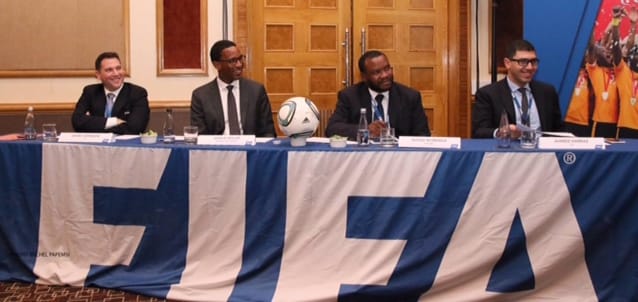The FIFA Club Licensing Seminar, run in collaboration with the Confederation of African Football (CAF), kicked off in Johannesburg on Tuesday with delegates unanimous that this project would change the face of the game globally.
FIFA’s new Head of Professional Football, Australian James Johnson, former Newcastle and Trinidad & Tobago goalkeeper Shaka Hislop and CAF Club Licensing Manager Ahmed Harraz all believe the Club Licensing programme will go a long way in helping member federations to a more efficient and viable set-up.
In his opening remarks in a workshop being attended by several federation secretary generals, senior managers, former professional players, CAF and FIFA members, Johnson said the club licensing was an important tool that will drive part of the broader reforms within the game.
“By working together, sharing our expertise and pooling our efforts, we can make club licensing a major driver of football development – improving stadium safety, fan experience and youth football development with the ultimate goal of opening access to and improving standards of the game for players, fans, clubs and leagues across the world,” Johnson said.
Johnson lauded CAF for making huge headway with regards to club licensing since last year, boasting 61 licensed clubs from 26 federations compared to zero at this time last year.
The aim is for all member associations to implement the Club Licensing Systems and in this regard, FIFA has agreed with CAF to organise four sub-regional seminars this calendar year.
CAF’s Club Licensing Manager, Ahmed Harraz (above, far right), told COSAFA.com of the aim of the continental body is raising standards across Africa.
“Our main target in this seminar is to explain to the member associations the points they are still missing, that they need to complete, to be in full compliance with our licensing programme,” Harraz said.
“CAF will start implementing proper licensing from 2017, so it is important that before the end of this year [2016] we have a understanding across the board of what is required.
“Also, we want to highlight the importance of the key stakeholders – the club licensing manager in every association, how to manage the system, the process, the timelines, and so on.
“Every association will eventually have a club licensing manager so it is important for them to be able to choose this individual, that they know what the requirements of this person will be.”
For the moment the licensing programme will stretch only to clubs who are to compete in CAF continental club competitions, but the long-term aim is to have it implemented nationally in each association.
“The five general criteria we look at are administration, finances, legal, sporting criteria and infrastructure. Under each one of these there are a number of requirements that must be completed by the club,” Harraz said.
Hislop (above), who gave a keynote opening address, said the club licensing seminars would change the face of global football as they would expedite football development through structured academies, coaching, uplift women football and general grassroots development.
“Generally, this will help smaller nations as member federations will share experiences which will help bridge disparities that currently exist among nations,” he said.
“The better the smaller of us is made, the better the larger of us will become.”
As per directive of new FIFA President, Gianni Infantino, the FIFA club licensing initiatives shall be developed in all territories as a way of professionalising club football.



